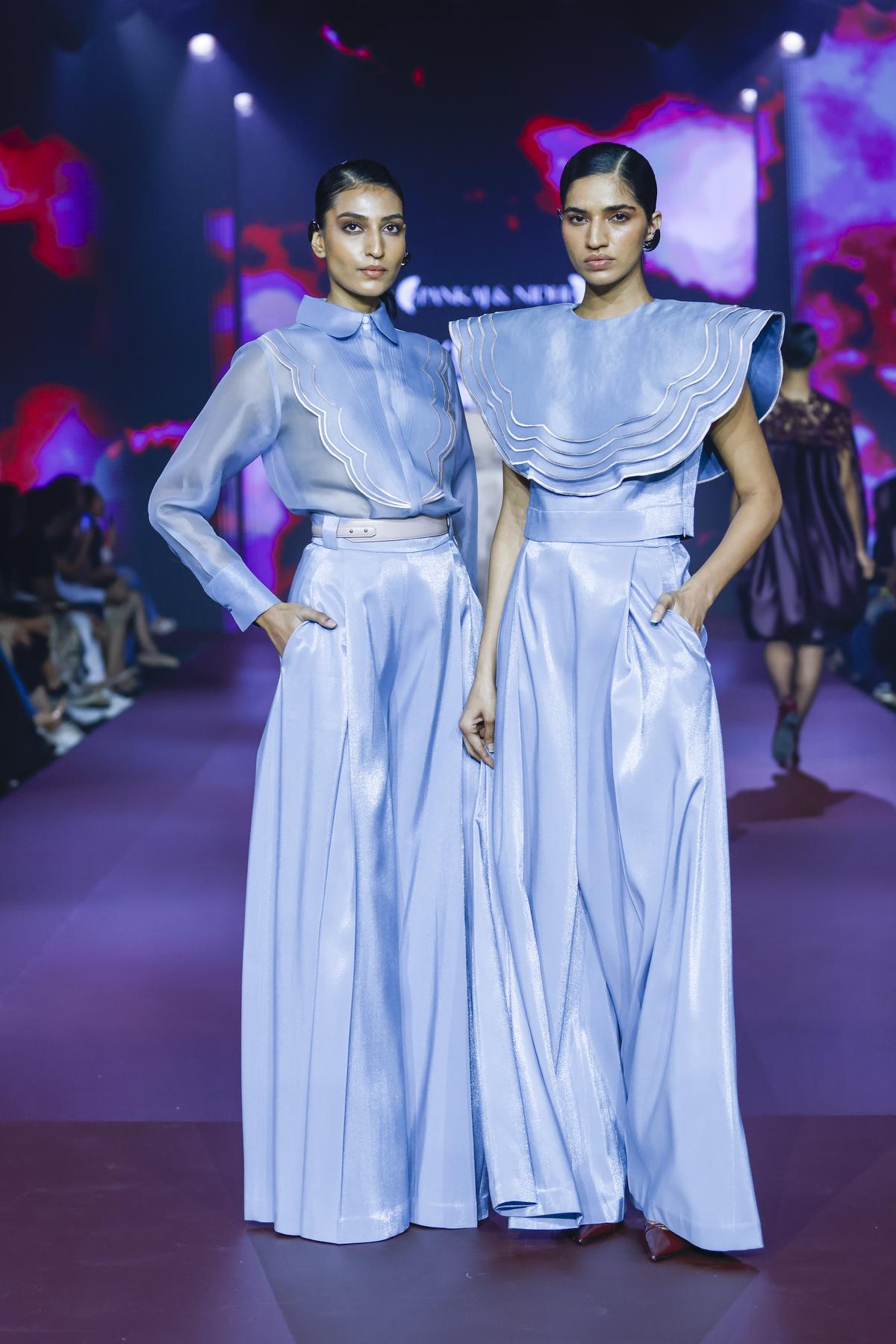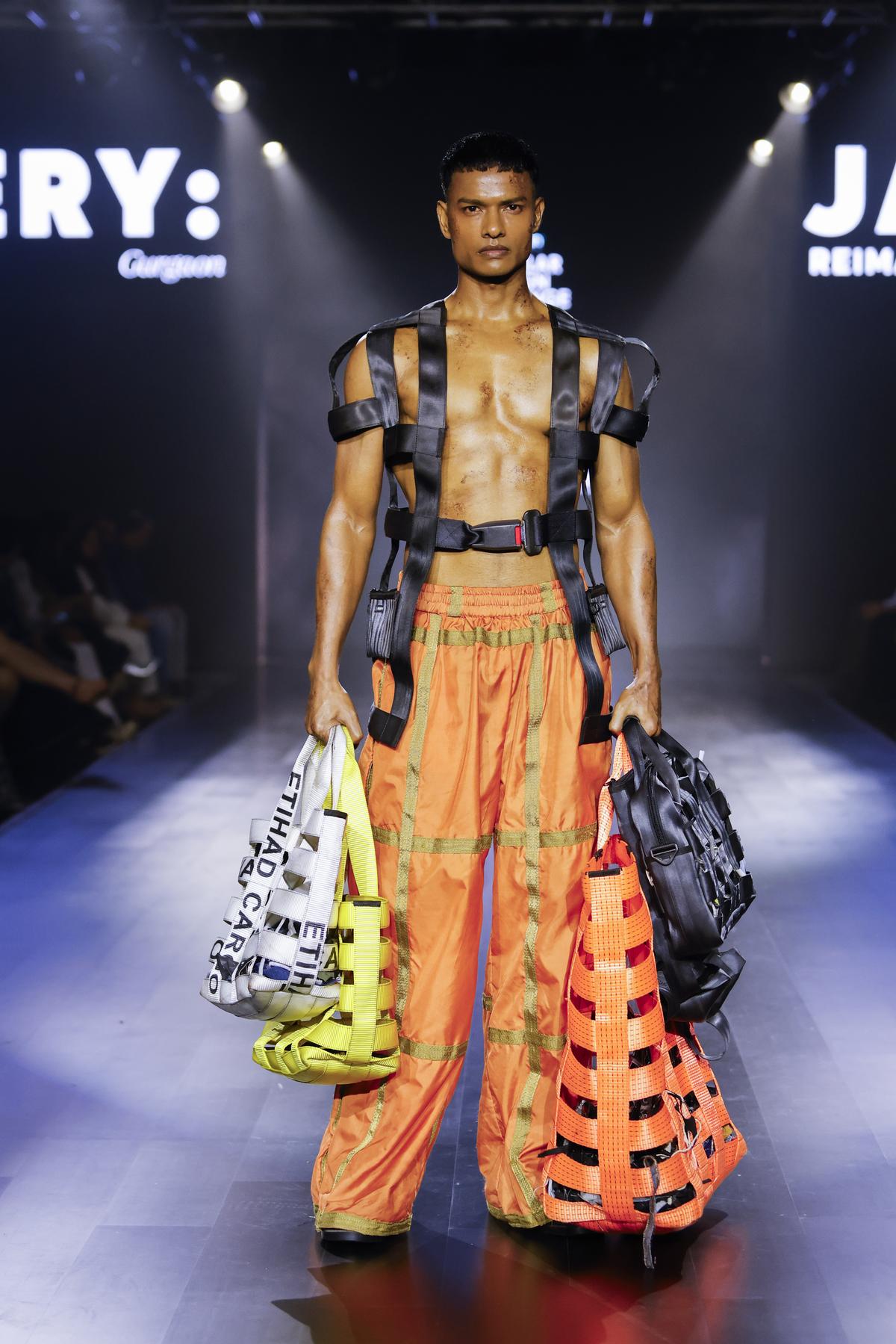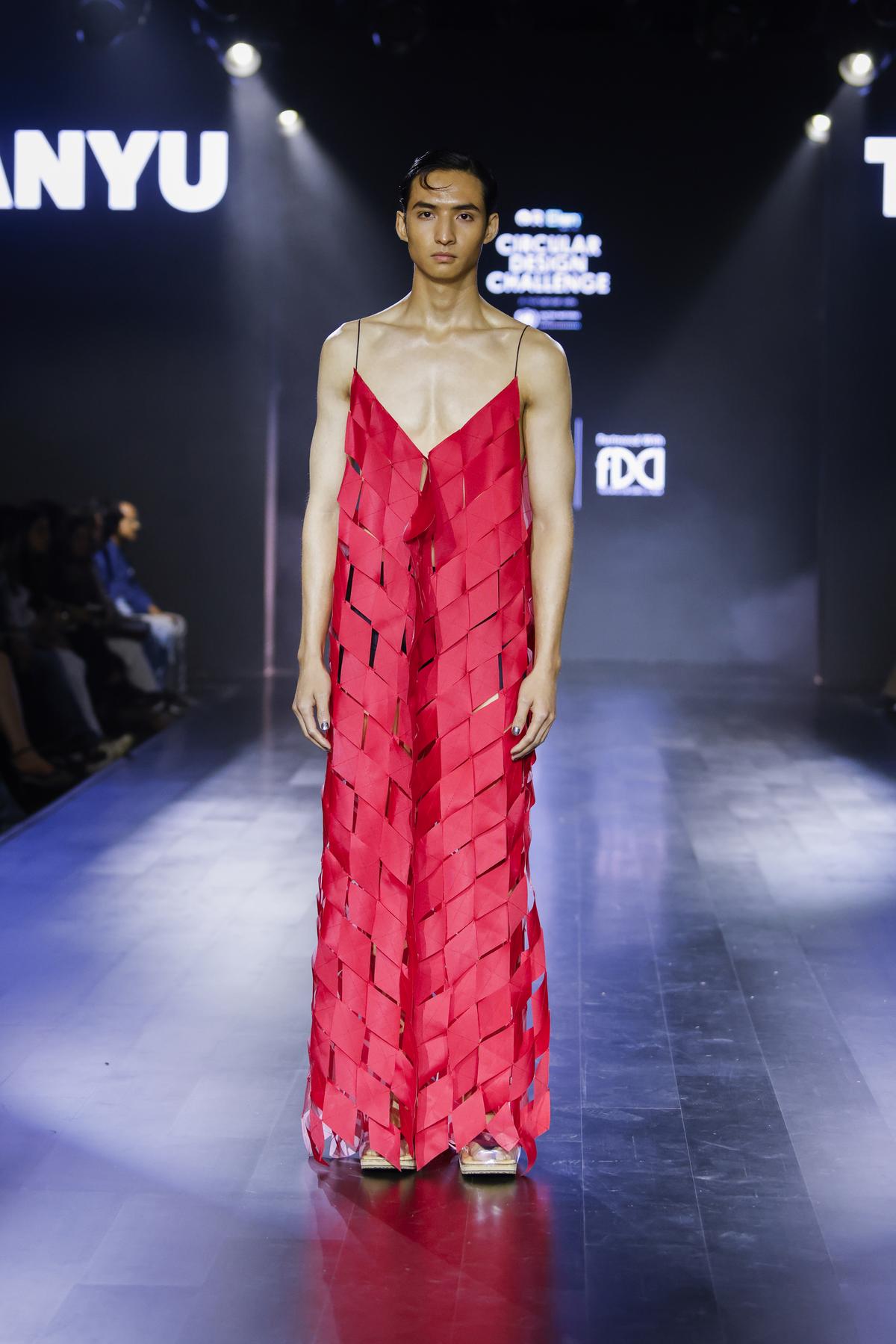
In tandem with Navaratri and Durga Puja, a different festivity unfolded in Delhi: the latest edition of Lakmé Fashion Week (LFW) in partnership with the Fashion Design Council of India (FDCI).
Hosted between October 9 and 13 across The Grand hotel in Delhi and a few off-site venues such as The Imperial hotel and a colonial building in Barakhamba, this edition of LFW — which will celebrate its silver jubilee next year — presented collections from over 45 designers, plus student shows and retail brand presentations from Marks & Spencer and Kalki.
Additionally, the calendar included the R|Elan Circular Design Challenge (CDC), an annual competition organised in partnership with the UN in India; this year saw seven finalists, including three international labels, compete for the prize money and a change to showcase their collection on the runway in the next season. Here are vignettes from this season, key emerging trends and shows that celebrated both nostalgia and innovation.
Model walks the ramp during Dhruv Kapoor show at the Lakme Fashion Week 2024
| Photo Credit:
Perfect Shadows / FDCI x Lakme Fashion Week / RISE Worldwide
Canvas of denim
“Denim, for us, represents versatility and resilience — qualities that resonate deeply with our design ethos. It’s a fabric that we continuously reimagine,” says Pranav Mishra, co-founder of Huemn, who streaked the material with mud for a collection in collaboration with textile company R|Elan. Huemn was among the many labels which experimented with denim this season, whether it was classic blue, washed and distressed, embellished and embroidered. This included Pero’s collaborative line with Hello Kitty, designer Payal Pratap who has used it for the first time in a collection and menswear designer Pawal Sachdevaa’s designs which featured denim treated with washes, colour, and brushstrokes. Not one to ever fade entirely from the trends cycle, denim is however set for a bigger comeback, according to Sunil Sethi, president of FDCI which also hosted The Denim Edit on day two. The group show featured five designers — Ashish N Soni, 1:11/ Eleven Eleven, Dhruv Kapoor, Kanika Goyal Label (KGL), and Countrymade — whose work incorporates the material.
Model walks the ramp during KGL show at the Lakme Fashion Week 2024
| Photo Credit:
Perfect Shadows / FDCI x Lakme Fashion Week / RISE Worldwide
Conversations around denim in recent years focussing on its water-intensive processes and use of synthetics for stretch led many designers to work on low-impact solutions. At 11.11/eleven.eleven, co-founders Mia Morikawa and Shani Himanshu showcased a line of handspun and handwoven denim crafted using organic cotton and natural dyes such as indigo and madder. Sushant Abrol, designer and founder of Countrymade used leftover denim to create a patchwork surface pattern reminiscent of camouflage. Denim was also at the core of Rkive City, a label by Ritwik Khanna who won this year’s R|Elan Circular Design Challenge, an annual competition hosted in partnership with the UN in India.

Model walks the ramp during Pankaj and Nidhi show at the Lakme Fashion Week 2024
| Photo Credit:
Perfect Shadows / FDCI x Lakme Fashion Week / RISE Worldwide
Understated occasion wear
On the penultimate day of fashion week, Tarun Tahiliani unveiled OTT, a new luxury prêt label with a forthcoming flagship store among other retail plans. Luxury prêt is an emerging category in Indian high fashion, with a number of labels — primarily couture and occasion wear — launching collections and sub-labels that offer more affordable iterations of signature designs. Tarun has, on several occasions since the early 2000s, created such collections, and OTT’s signatures are stitched into this lifelong oeuvre. With focus on construction and versatility, draping anchored the collection heavy on ivory, black, navy, taupe, and burgundy; embroidery and artistic prints punctuated the designs, and a line of accessories. “OTT simplifies our signature elements, making them the hero of the piece without overwhelming the overall design. This pared-down approach gives wearers the freedom to style the garments in various ways, making them wardrobe staples that will endure season after season,” says Tarun, adding that the label speaks “a different language of India Modern”.
Model walks the ramp during the show of Nexa Presents OTT by Tarun Tahiliani
| Photo Credit:
Perfect Shadows / FDCI x Lakme Fashion Week / RISE Worldwide
Tarun was not the only designer keen on a quieter expression of occasion wear. Antar-Agni by Ujjawal Dubey juxtaposed sharp silhouettes and draping in his Two-Faced collection. The 44 ensembles comprised separates crafted from cottons and silks as well as jacquard, handwoven in Varanasi. Pintucked surfaces and finely layered embellishments elevated the dark shades which went from black and charcoal to forest green and purple. “We have done a lot of deconstruction in metal and tissue, and dipped in grey because I wanted to get back to our core in a stronger format,” says Ujjawal, who is marking 10 years of his label. In a different take on understated occasion wear, Pankaj & Nidhi’s Westernwear line, Loop offered kimono-inspired jackets, cocoon skirts, latticed gilets and other separates in solid colours, offset with tonal embellishments referencing the infinity loop.
Model walks the ramp during Abraham & Thakore show at the Lakme Fashion Week 2024
| Photo Credit:
Perfect Shadows / FDCI x Lakme Fashion Week / RISE Worldwide
Experiments with textures
This season, designers offered myriad ways to work with textures by using techniques as varied as embroidery, crochet, embellishments, patchwork, quilting, knitting, and appliqué. Menswear label MARGN, which was part of the season’s GenNext cohort, presented a collection rife with knitted and crochet appliqués, quilted knit vests, and even bangles. Kolkata-based designer Richa Khemka applied a mosaic pattern on her garments, using 3D embellishments, beads, sequins, and appliqué. Designer Payal Pratap’s showcase Kiss From A Rose presented her inspiration — childhood memories of her mother’s garden — in several forms including a textured patchwork iteration that comes across as pixelated, cross-stitch blooms. “We created a pattern using small square patches of fabrics to create it. I wanted to showcase the flower as an abstract pattern,” says Payal, who additionally experimented with sequins and embellishments for the collection.
Model walks the ramp during Payal Pratap show at the Lakme Fashion Week 2024
| Photo Credit:
Perfect Shadows / FDCI x Lakme Fashion Week / RISE Worldwide
Texture was also the protagonist for designer Ankur Verma, whose label Til was winner of The Spotlight competition this season. His collection, titled Mirage, presented painterly surfaces created using a variety of textile surfaces and embroidery, with a distinct inspiration of Impressionist art. “A lot of people have compared the textiles to landscapes and galaxies, but my idea was to really do textures and leave them open to interpretation,” says Ankur. Among the standouts were a line of garments whose textures resembled woollen sweaters at first glance; they were in fact katran (leftover textiles) that had been knitted together by the artisanal team.

Model walks the ramp during R|Elan Circular Design Challenge
| Photo Credit:
Perfect Shadows / FDCI x Lakme Fashion Week / RISE Worldwide
Material innovations
The sustainability discourse in fashion has led to a surge in the development of various materials that can replace the use of virgin resources. On day one, pegged as Sustainable Fashion Day, Abraham & Thakore showcased an array of such materials developed from waste in their collection, Finding Beauty. Designers David Abraham and Rakesh Thakore have long used discarded X-rays to create black and white laser-cut sequins; this season, they added cassette tapes, polyethylene trash bags, empty packets of chips, silver foil, and burlap to the mix. Woven into organzas and silk, or cut and shaped as sequins for use on saris and garments.

Model walks the ramp during R|Elan Circular Design Challenge
| Photo Credit:
Perfect Shadows / FDCI x Lakme Fashion Week / RISE Worldwide
The Circular Design Challenge, in keeping with its design parameters, featured a number of new material interventions. Gautam Malik, founder of the label Jaggery, upcycled waste from the automobile and defence sectors — seatbelts, cargo belts, decommissioned army parachutes, ex-army canvas and old army tents — into garments and bags. Japanese designer Tsang Fan Yu’s designs included vintage kimonos and life jackets while A Blunt Story, an Indian footwear label by Chandni Batra, showcased its proprietary materials featuring bio-based and natural materials such as cork, rice husk, bamboo, oil from soy and palm, as well as fabric waste, post-industrial leather waste and recycled pet waste.
Ananya Panday with Rohit Bal
| Photo Credit:
Special Arrangement
Back with a bang
With major designer showcases and larger than life settings, Lakmé Fashion Week’s grand finale is always a well-attended affair. Anticipation this season was even higher, with couturier Rohit Bal presenting his new collection Kaynaat (meaning the universe). In a press statement, Rohit described the collection as “a journey through the wonders of Nature, celebrating the bloom of life and beauty,” thematically aligned with show sponsor Lakmé’s Ethereal Bloom makeup line. A selection of ivory ensembles opened the show, as the collection reiterated his signatures in silhouettes and colours, as well as motifs such as flowers — embroidered or printed, in a play of proportions on jackets and lehengas. Lush scenery and gilded details evoked Baroque aesthetics and fairy tales; elephants, deer, toucans, and cranes sharing the canvas of cloth with the sun and moon, vines and branches. Actor and Lakmé brand ambassador Ananya Panday played showstopper, in a black and gold cape and lehengafilled with roses.
Kaynaat by Rohit Bal
| Photo Credit:
Special Arrangement
Nostalgia underlined every aspect of the show, from the clothing’s archival quality to the presentation. This is Rohit’s first runway showcase since his critical cardiac complications last year. Sitting in the front row through the duration of the show, the designer looked fragile but broke into a dance when he walked up on stage to take a bow. This jig has always been part of his runway presence, an expression of his joie de vivre. But this time it was also an act of resilience.
—-
Published – October 17, 2024 02:55 pm IST




